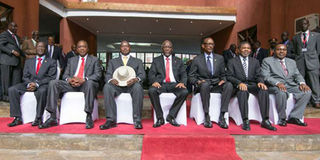United East Africa best solution yet to ethno-regional tensions

President Uhuru Kenyatta joins other Heads of State from the East African Community for the 17th Ordinary EAC Summit Arusha Tanzania on March 2, 2016. PHOTO | NATION MEDIA GROUP
What you need to know:
- If East Africa were a country, it would be the 10th biggest by population (133 million).
- It is not a secret that today there are tensions between some countries in the region.
The case for deepening integration among the five East African Community member states is often outlined in economic terms. This is reasonable because the benefits citizens would draw from substantive integration are clear.
If East Africa were a country, it would be the 10th biggest by population (133 million) — between Russia (143 million) and Mexico (130 million). A truly united East Africa, with common rules for trade and, maybe, and even a monetary union, would be one of the most attractive markets on earth.
This is a region of immense promise with abundant human and natural resources, a combined GDP of $74.5 billion and, in the age of Great Power competition, in a location that is of considerable geopolitical significance. Yet the benefits of deeper integration go beyond raw facts and figures.
The political advantages of an expanded, federal polity comprising Rwanda, Burundi, Uganda, Kenya to Tanzania — and South Sudan — are major.
ECONOMI INTEGRATION
An East African federation with real political and economic integration would be a massive boon for efforts to advance social and political cohesion in the region.
It would address internal tensions within the smaller units and, at a stroke, render irrelevant the various ethno-regional tensions that characterise countries.
It is not a secret that today there are tensions between some countries in the region. A scheduled 20th Ordinary Meeting of the EAC Heads of State, which was to be held in Arusha on Thursday, has been postponed twice this year. A ministerial meeting has been put off indefinitely.
The schisms include tension between Kigali and Kampala with the leaders of both states accusing each other of meddling in the internal affairs of the other. Burundi is seemingly isolated, with its president lashing out at external actors for trying to resolve the political crisis in Bujumbura.
ISOLATIONIST STANCE
Tanzania, meanwhile, has appeared bent on adopting an isolationist stance in recent years. Both leaders of Kenya and Uganda have complained about harassment of their countries’ traders and the adoption of barriers to trade and social interactions between their citizens and Tanzanians.
Yet, the reality is that, while these divisions are real, they also can easily be resolved through engagement by the respective heads of state.
The more profound challenge to stability all these countries face is internal and many of the disputes are of an ethnic and regional character. A united, integrated federation would be an excellent option for resolving some of these contradictions and rivalries which threaten stability.
None of the countries, individually, is unaffected by these. But, collectively, these rivalries would be obviated, certainly reduced, through integration and, hopefully, one day, one East African country.
EXPAND HORIZONS
The divisions in Burundi and Rwanda, for example, have produced a cycle of horrific blood-letting. Wouldn't it be wonderful if the minority-majority tensions in those countries were subsumed by a united and functional East African federation? It would be a great day when a young college student in Kigali dreams of finding work in the Kenyan port city of Mombasa within one East Africa. This would expand horizons and take the poison out of the tensions in smaller countries.
This is true of Kenya, where the Kikuyu-Luo elite rivalry has informed politics for decades. This would be rendered irrelevant.
So, too, would Uganda be liberated from the historical tensions between Kampala and the north, which perceives itself as marginalised and robbed of a political voice since the fall of Amin’s dictatorship. The Baganda question would be addressed.
Tanzania has, historically, been one of the more cohesive countries in the region but it has an open sore in Zanzibar, which has, for a long time, bitterly agitated for secession and complained about economic and political marginalisation. A federation would heal that.
Politicians, civil society, diplomats, media commentators should emphasise the promise of regional integration in creating a cohesive and stable East Africa.
The economic benefits are very clear but the case for the potential of integration to unite society is just as compelling.
Mr Mugwang’a, a communications consultant, is a former crime and security reporter. [email protected]. @mykeysoul




